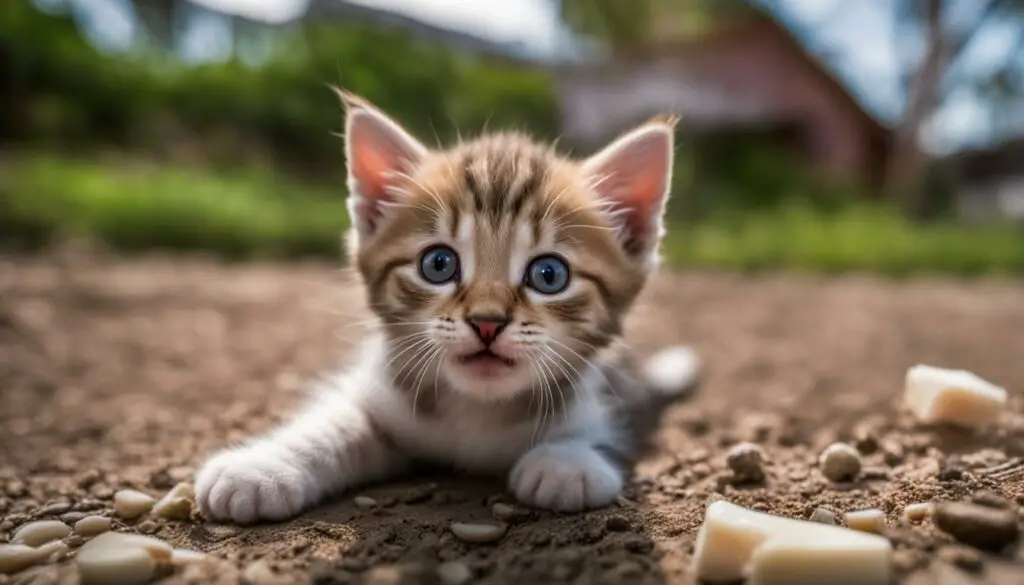When I noticed that my kitten’s tooth fell out at 5 months old, I was initially worried. However, after doing some research, I discovered that this is a normal part of a kitten’s dental development. In this article, I will share what I’ve learned about kitten teething, the timeline of tooth loss, and how to ensure proper dental care for your furry friend.
Key Takeaways:
- Kitten tooth loss at 5 months is a normal part of dental development.
- Monitor signs and symptoms of teething in kittens, such as chewing more and mild gum inflammation.
- Provide appropriate toys and avoid letting your kitten chew on hazardous objects.
- Consult with a veterinarian if your kitten is in pain or exhibits other concerning signs.
- Regular dental care, including brushing and check-ups, is essential for your kitten’s oral health.
The Timeline of Kitten Teething
Understanding the timeline of kitten teething is essential for every cat owner. The process of teething in kittens is a natural and normal part of their growth and development. It is important to know when to expect specific changes in their dental development to ensure proper care and hygiene. Let’s take a closer look at the timeline of kitten teething and how many teeth kittens typically have.
The Timeline of Kitten Teething
Kittens are born without teeth, but their baby teeth, also known as deciduous teeth, begin to emerge around 3 weeks of age. By the time they reach 6 weeks old, all 26 baby teeth should have fully emerged. These baby teeth are smaller and sharper than adult teeth, and they serve the purpose of allowing kittens to eat solid food and explore their world.
At around 3 months old, the process of losing baby teeth and growing adult teeth begins. During this time, you may notice that your kitten starts to lose their baby teeth. The adult teeth, which are larger and more durable, start to replace the baby teeth. This overlap between the shedding of baby teeth and the eruption of adult teeth can cause some discomfort and sensitivity for kittens.
By the time a kitten is 6 to 7 months old, all 30 of their adult teeth should have appeared. These adult teeth are stronger and more suitable for their lifelong dental health. It’s important to note that the timing of teething may vary slightly from kitten to kitten, but the general timeline remains consistent.
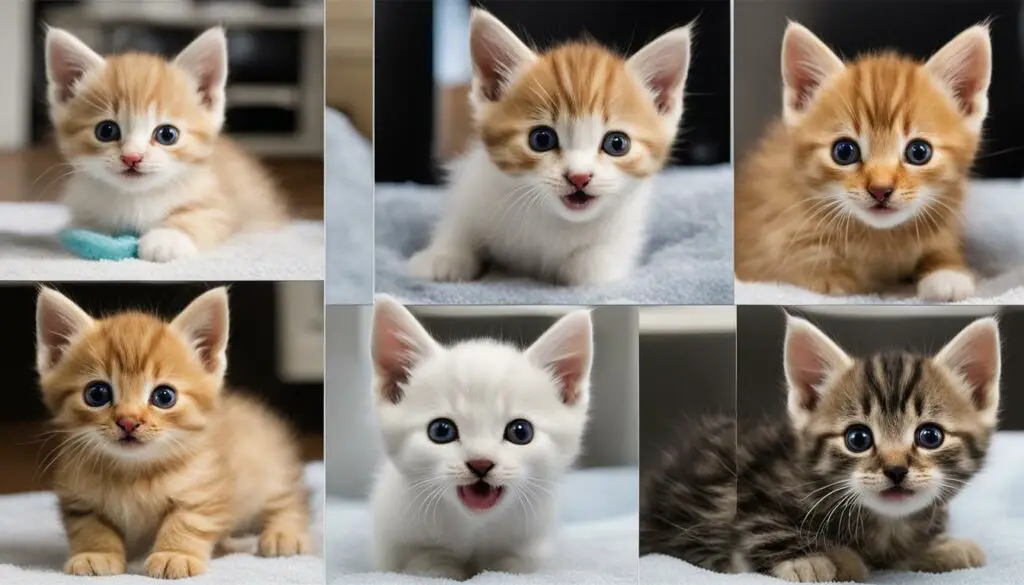
Signs and Symptoms of Teething in Kittens
During the teething process, kittens may exhibit certain signs and symptoms that indicate their baby teeth are falling out. These signs include increased chewing behavior, as kittens seek relief from the discomfort they may experience. You may also notice that your kitten is eating less than usual, as their tender gums make it uncomfortable for them to eat solid food. Another sign to look out for is decreased grooming, as kittens may find it difficult to groom themselves due to the sensitivity in their mouth.
Additionally, kittens may approach their food more cautiously, taking smaller bites or hesitating before eating. This behavior is common as they adjust to the new sensation of their adult teeth coming in. You may also discover baby teeth around your home, as kittens often swallow them while eating or playing. Lastly, mild gum inflammation known as gingivitis may occur during the teething process. This can cause redness and tenderness in the gums, but it should resolve on its own as the teething process progresses.
Signs and Symptoms of Teething in Kittens:
- Increased chewing behavior
- Decreased appetite
- Decreased grooming
- Cautious approach to food
- Finding baby teeth around the home
- Mild gum inflammation (gingivitis)
It’s important to monitor these signs and symptoms closely to ensure your kitten’s comfort during the teething process. Providing appropriate care, such as offering teething toys and ensuring they have a soft diet, can help alleviate any discomfort they may experience. However, if you notice any severe or persistent symptoms, it’s recommended to consult with a veterinarian for further evaluation and guidance.
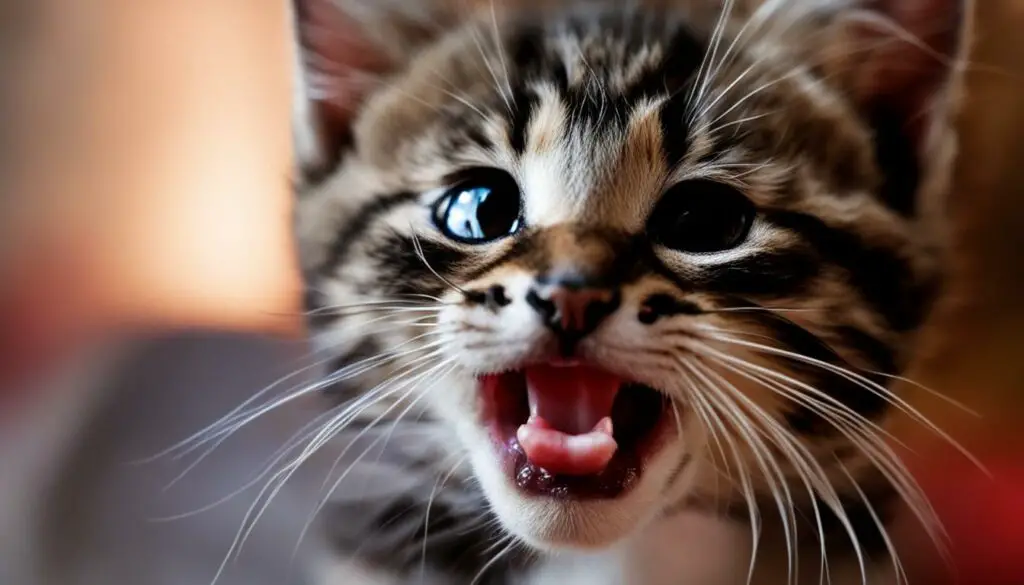
| Signs and Symptoms of Teething in Kittens | Actions to Take |
|---|---|
| Increased chewing behavior | Offer teething toys to redirect their chewing habit and relieve discomfort. |
| Decreased appetite | Provide soft food that is easier for them to chew and swallow. |
| Decreased grooming | Gently groom your kitten to help them maintain their cleanliness. |
| Cautious approach to food | Be patient and offer enticing, soft food options to encourage eating. |
| Finding baby teeth around the home | Ensure a safe environment and monitor your kitten to prevent any swallowing of foreign objects. |
| Mild gum inflammation (gingivitis) | The inflammation should subside as the teething process progresses. If it persists or worsens, consult with a veterinarian. |
How to Help Your Teething Kitten
During the teething process, it’s important to provide your kitten with the necessary care and attention to help alleviate any discomfort. Here are some tips on how to help your teething kitten:
1. Provide appropriate chewing options
Kittens naturally have the urge to chew while teething. Instead of allowing them to chew on your hands or feet, provide them with pet-safe chew toys. Look for toys specifically designed for teething kittens, as they are softer and more gentle on their sensitive gums. This will help satisfy their natural chewing instinct and prevent them from developing a habit of chewing on inappropriate objects.
2. Ensure plenty of playtime
Engaging in playtime activities with your teething kitten can serve as a distraction from any discomfort they may be experiencing. Make sure to use toys that are appropriate for their age and size. Avoid games that involve pulling toys from their mouth, as this can cause further irritation to their gums. Gentle playtime sessions will not only keep them entertained but also provide a positive bonding experience between you and your kitten.
3. Be mindful of their diet
While your kitten is teething, their gums may be sensitive, making it uncomfortable to chew on hard kibble. Consider temporarily switching to soft or wet food until they have finished teething. This will help prevent any unnecessary discomfort during mealtime. Consult with your veterinarian for specific dietary recommendations based on your kitten’s needs.
4. Keep hazardous objects out of reach
Teething kittens may have the tendency to chew on anything they can find. It’s important to ensure their safety by keeping hazardous objects out of their reach. This includes items such as electrical cords, small toys, and plants that may be toxic to cats. Providing a safe and stimulating environment will help protect your kitten from potential accidents or ingesting harmful substances.
By following these tips, you can help your teething kitten navigate through this developmental stage with ease and comfort. Remember to consult with your veterinarian for any specific concerns or questions you may have regarding your kitten’s oral health.

When to Seek Veterinary Assistance
If your kitten is experiencing any concerning symptoms or issues related to teething, it’s important to seek veterinary assistance. A veterinarian can provide the necessary guidance and treatment to ensure your kitten’s dental health and overall well-being.
Signs to Look Out For:
- Dribbling or drooling excessively
- Pawing at the mouth
- Difficulty in eating or dropping food
- Reluctance to eat or growling at food
- Grinding of teeth
If you notice any of these signs, it’s best to consult with a veterinarian as soon as possible. Additionally, there are other situations where veterinary assistance may be necessary:
Missing Adult Teeth: Adult teeth should appear by the time a kitten is 6-7 months old. If your kitten’s adult teeth have not emerged, it’s important to consult with a veterinarian to address any potential underlying issues.
Retained Baby Teeth: In some cases, a kitten’s baby teeth may not fall out naturally, resulting in retained deciduous teeth. This condition can lead to dental problems, such as overcrowding or misalignment. A veterinarian can evaluate the situation and recommend appropriate treatment, which may involve removal of the retained teeth.
| Signs to Watch For | When to See a Vet |
|---|---|
| Dribbling or drooling excessively | If the excess drooling persists or is accompanied by other symptoms |
| Pawing at the mouth | If pawing at the mouth becomes excessive or results in injury |
| Difficulty in eating or dropping food | If the difficulties persist or lead to weight loss |
| Reluctance to eat or growling at food | If the behavior persists or worsens over time |
| Grinding of teeth | If teeth grinding is accompanied by other signs of discomfort or pain |
Remember, if you have any concerns about your teething kitten, it’s always best to consult with a veterinarian. They can provide expert advice and ensure your kitten’s dental health is properly taken care of.
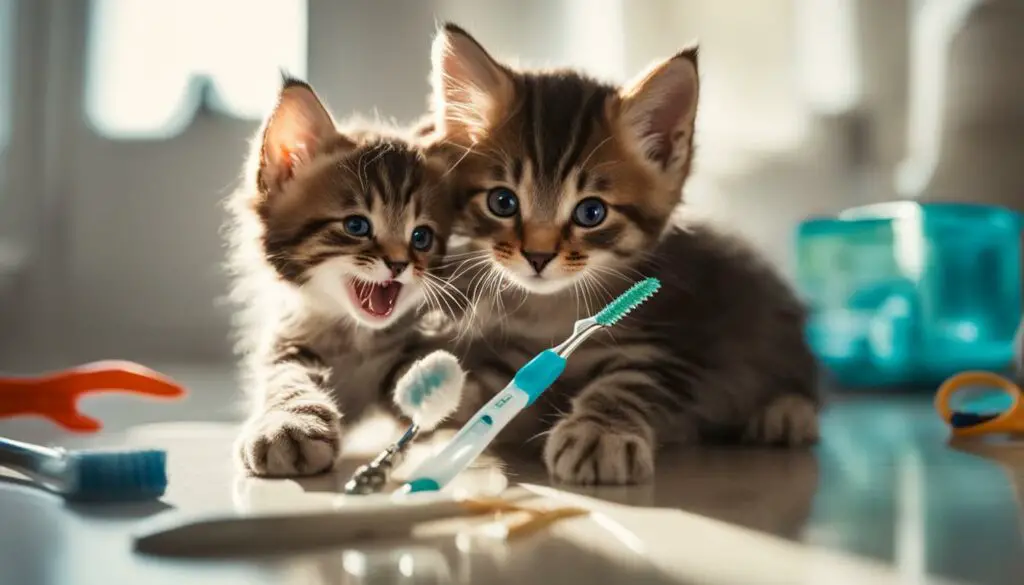
Feeding Tips for Teething Kittens
During the teething process, it’s crucial to provide appropriate nutrition for your kitten. Choosing the right food can help soothe their sensitive gums and support their overall dental health. Here are some feeding tips to consider:
1. Age-appropriate food:
Until your kitten reaches six months old, it’s best to feed them food specifically designed for young cats. These formulas are softer and easier for teething kittens to chew. Avoid giving them hard adult cat food, as it can potentially chip their baby or kitten teeth.
2. Wet food options:
If you’re not ready to introduce hard food to your teething kitten, canned cat food can be a suitable alternative. Wet food provides a soft texture that is gentle on their sensitive gums while still providing the necessary nutrients for their growth and development.
3. Dental care considerations:
Even during the teething process, it’s essential to prioritize your kitten’s dental care. Regularly brushing their teeth with a vet-approved brush and toothpaste specially formulated for cats can help remove plaque and prevent dental issues. You can gradually introduce toothbrushing to your kitten by starting with gentle massages along their gums.
Feeding your teething kitten the right food and prioritizing their dental care can contribute to their overall oral health and comfort during this stage of development.
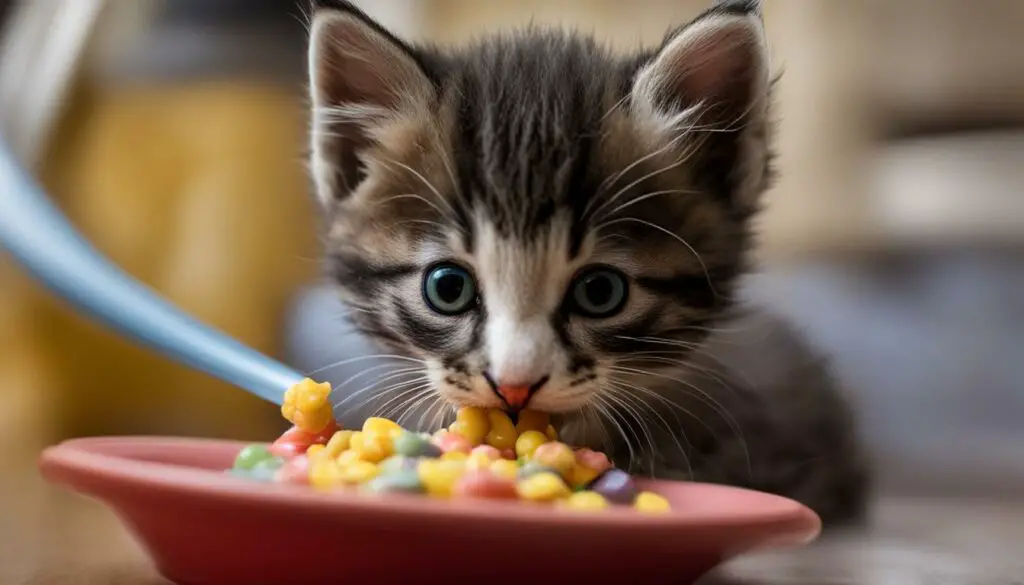
Dental Hygiene Tips for Kittens
Proper dental care is essential for maintaining the oral health of kittens. By following these dental hygiene tips, you can ensure that your furry friend’s teeth and gums stay healthy throughout their life.
1. Introduce Teeth Brushing Early
Table: Steps for Introducing Teeth Brushing to Your Kitten
| Step | Description |
|---|---|
| Step 1 | Start by gently touching your kitten’s lips and gums to get them used to the sensation. |
| Step 2 | Gradually introduce a vet-approved toothbrush and toothpaste designed specifically for cats. |
| Step 3 | Brush your kitten’s teeth in small, circular motions, focusing on the gum line. |
| Step 4 | Reward your kitten with praise and treats after each successful brushing session. |
2. Provide Dental-Friendly Toys and Treats
List: Dental-Friendly Toys and Treats for Kittens
- Dental chew toys specifically designed to promote healthy teeth and gums.
- Catnip-infused toys that encourage your kitten to play and chew.
- Treats with dental benefits, such as those formulated to reduce tartar and plaque build-up.
3. Schedule Regular Dental Check-Ups
Regular dental check-ups with your veterinarian are essential for monitoring your kitten’s oral health. During these appointments, the vet can examine your kitten’s teeth and gums, provide professional cleanings if necessary, and address any dental issues that may arise.
By implementing these dental hygiene tips, you can ensure that your kitten maintains good oral health and enjoys a lifetime of healthy smiles. Remember to consult with your veterinarian for personalized advice and guidance regarding your kitten’s dental care needs.
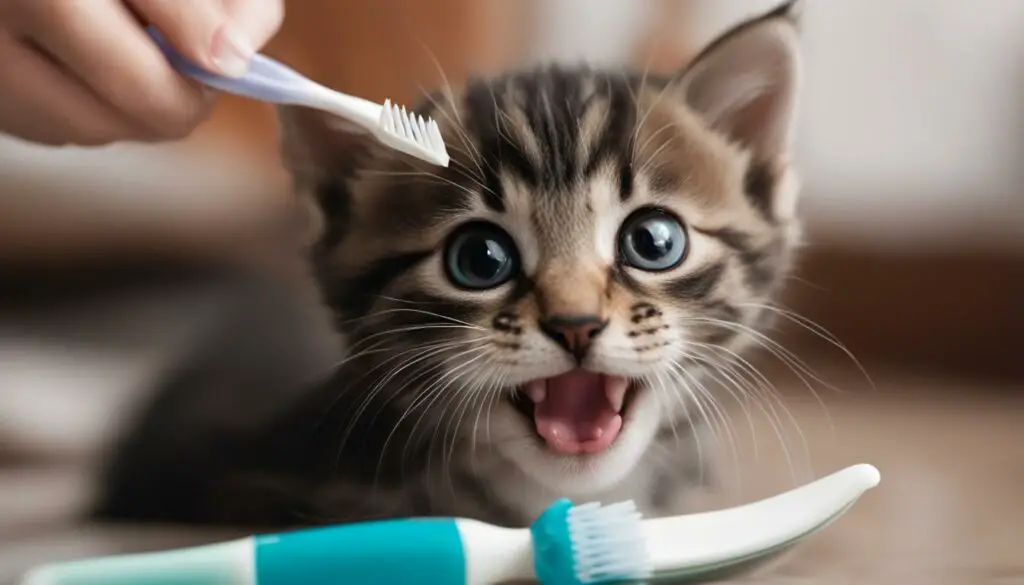
The Importance of Monitoring Your Kitten’s Teeth
Ensuring proper dental care for your kitten is crucial for their overall health and well-being. Monitoring their teeth is an essential part of this care, as it allows you to detect any dental problems early on and take appropriate action. Regularly checking your kitten’s teeth and gums can help prevent issues such as tooth decay, dental infections, and gum disease. By keeping a close eye on their dental health, you can ensure that your kitten maintains a healthy and pain-free mouth.
One of the main reasons why monitoring your kitten’s teeth is important is to prevent tooth decay. Just like humans, kittens can develop cavities that can lead to pain, discomfort, and potential tooth loss. By regularly checking their teeth, you can identify any signs of decay, such as discolored or damaged teeth, and seek veterinary assistance to address the issue promptly. Early detection and treatment can help prevent further decay and preserve your kitten’s dental health.
In addition to preventing tooth decay, monitoring your kitten’s teeth also helps in identifying other dental problems that may arise. This includes issues such as dental fractures, abscesses, and infections. These conditions can cause significant pain and discomfort for your kitten, affecting their ability to eat and overall quality of life. By regularly examining their teeth, you can spot any abnormalities or signs of pain, allowing you to seek veterinary care and provide the necessary treatment.
| Dental Problems in Kittens | Signs and Symptoms |
|---|---|
| Tooth Decay | Discolored teeth, bad breath, reluctance to eat |
| Gum Disease | Swollen, red, or bleeding gums, bad breath |
| Dental Infections | Pain, swelling of the face or jaw, difficulty eating |
Regular dental check-ups with a veterinarian are also essential for maintaining your kitten’s dental health. A veterinarian can perform a thorough examination of their teeth and gums, provide professional cleanings if necessary, and offer guidance on proper dental care at home. They can also address any concerns you may have and provide advice on toothbrushing techniques, dental-friendly toys, and appropriate diets for optimal dental health. By working closely with a veterinarian, you can ensure that your kitten receives the best possible dental care throughout their life.
Common Questions About Kitten Tooth Loss
As a pet owner, you may have several questions about your kitten’s tooth loss. Understanding the process of kitten teething and tooth loss can help alleviate any concerns and ensure proper care for your furry friend. Here are answers to some common questions:
Why do kittens lose their teeth?
Kittens lose their teeth because their adult teeth start to come in. This process typically begins around 3 months of age and continues until they are 6-7 months old. The baby teeth, also known as deciduous teeth, start to loosen and fall out to make way for the permanent adult teeth to emerge.
What happens if a kitten doesn’t lose their baby teeth?
In some cases, a kitten may not naturally lose their baby teeth, leading to retained deciduous teeth. This can happen if the adult teeth grow in a way that prevents the baby teeth from falling out. Retained deciduous teeth can cause dental problems, such as overcrowding, misalignment, and increased risk of tooth decay. It’s important to have the retained teeth removed by a veterinarian to prevent further complications.
What if I never saw my kitten’s baby teeth?
It’s not uncommon for pet owners to never see their kitten’s baby teeth. The baby teeth are small and can easily be swallowed or lost without notice. As long as the adult teeth are coming in properly and your kitten is not experiencing any dental issues or discomfort, the absence of visible baby teeth is usually not a cause for concern.
By addressing these common questions, you can gain a better understanding of your kitten’s tooth loss and dental development. Remember, if you have any specific concerns or questions about your kitten’s dental health, it’s always best to consult with a veterinarian for personalized advice and guidance.

Understanding Retained Deciduous Teeth in Cats
During the teething process, it is normal for kittens to lose their baby teeth and have their adult teeth emerge. However, in some cases, kittens may experience a condition called retained deciduous teeth. This condition occurs when the baby teeth do not fall out as the adult teeth come in, leading to dental problems and potential complications.
Kittens with retained deciduous teeth may have adult teeth growing in behind their baby teeth, causing overcrowding and misalignment. This can lead to difficulty chewing, increased plaque and tartar buildup, and an increased risk of tooth decay and gum disease. It’s important to address this condition promptly to prevent further oral health issues.
If you suspect that your kitten may have retained deciduous teeth, it is essential to consult with a veterinarian. They will be able to examine your kitten’s mouth and determine the best course of action. In some cases, the retained baby teeth may need to be extracted to allow the adult teeth to properly align. This procedure is typically done under anesthesia for the kitten’s comfort and safety.
| Signs of Retained Deciduous Teeth in Kittens: | What to Do: |
|---|---|
| Adult teeth growing in behind baby teeth | Consult with a veterinarian for assessment |
| Difficulty chewing or eating | Ensure proper dental care and consider extraction if necessary |
| Increased plaque and tartar buildup | Regular dental cleanings and professional care |
| Risk of tooth decay and gum disease | Maintain good dental hygiene and seek veterinary assistance |
By addressing retained deciduous teeth in cats, you can help ensure the long-term oral health and well-being of your kitten. Regular dental check-ups, proper dental care, and prompt treatment can prevent complications and keep your furry friend smiling and comfortable.
Teething Habits of Kittens
Teething can be a challenging time for kittens as they experience discomfort and a strong urge to chew. Understanding the teething habits of kittens can help you provide appropriate care and prevent any potential damage to household items. During this stage, kittens may exhibit the following behaviors:
- Chewing on objects: Kittens may chew on various objects to alleviate the discomfort caused by teething. It is important to provide them with safe and appropriate toys to chew on, such as rubber or fabric toys specifically designed for teething kittens.
- Increased saliva production: Teething can result in excessive drooling as kittens try to soothe their gums. Keep in mind that this is a normal part of the teething process.
- Oral sensitivity: Kittens may become more sensitive to touch and may resist having their mouths or teeth examined. It is essential to handle their mouths gently and avoid causing any additional discomfort.
By understanding these teething habits, you can take steps to ensure your kitten’s comfort and redirect their chewing behavior towards appropriate objects. Providing suitable teething toys and supervising their playtime can help prevent them from damaging household items or ingesting anything harmful.
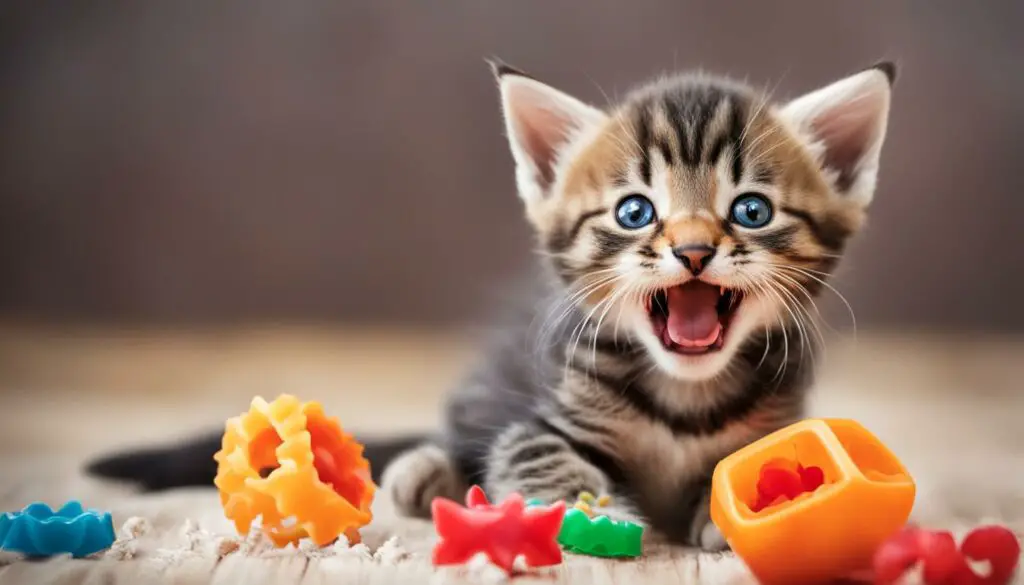
Dangerous objects to avoid during teething:
During the teething process, it is important to keep hazardous objects away from your kitten’s reach. Some common objects to be cautious of include:
- Electrical cords: Kittens may chew on cords, which can lead to electrical shocks or injuries.
- Sharp objects: Ensure that nails, pins, needles, and other sharp items are securely stored and out of reach.
- Toxic plants: Some plants can be toxic to kittens if ingested. Research the plants in your home and remove any that may pose a risk.
- Small objects: Avoid leaving small objects, such as buttons, coins, or small toys, within reach as kittens may swallow them accidentally.
By creating a safe environment and redirecting their chewing behavior towards appropriate toys, you can help your teething kitten navigate this phase with minimal discomfort and prevent any potential accidents.
Tips for a Comfortable Teething Experience
Teething can be uncomfortable for kittens as their adult teeth start to emerge. As a responsible pet owner, there are several tips you can follow to help alleviate their discomfort and make the teething process easier for both you and your furry friend.
Provide Chilled Teething Toys
One effective way to soothe your teething kitten’s gums is by offering them chilled teething toys. The coldness can help numb their gums and provide temporary relief from any discomfort. You can find a variety of teething toys specifically designed for kittens at pet stores or online. Make sure to choose toys that are safe and durable for your kitten to chew on.
Try Wet Washcloths
Another option to provide relief to your teething kitten is by offering them wet washcloths to chew on. Simply wet a washcloth with cool water and wring out any excess moisture. Place the damp washcloth in the freezer for a short period until it is chilled. Then, give it to your kitten to chew on. The texture and coldness can help soothe their gums.
Gently Massage Their Gums
You can also offer comfort to your teething kitten by gently massaging their gums. Wash your hands thoroughly and use your finger to apply gentle pressure on their gums. This can help relieve some of the discomfort and provide a soothing sensation. Be sure to do this with clean hands to prevent any potential infections.
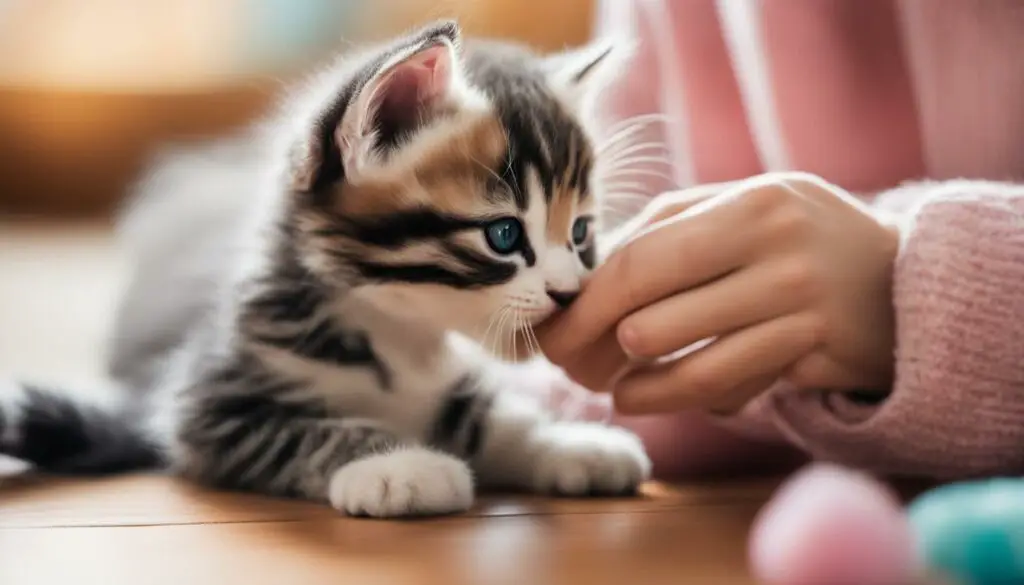
During the teething process, it’s essential to provide plenty of love, care, and attention to your kitten. Be patient with them as they may be irritable or more prone to chewing on objects. By implementing these tips and techniques, you can help ensure a comfortable teething experience for your kitten and support their overall well-being.
The Role of Veterinary Assistance in Teething Kittens
When it comes to the teething process in kittens, veterinary assistance plays a crucial role in ensuring their well-being. Regular check-ups with a veterinarian allow for the monitoring of dental development and early detection of any issues that may arise. Seeking vet help for teething kittens is important to ensure that any potential problems are addressed promptly and effectively.
A veterinarian can provide expert guidance and treatment when it comes to your teething kitten’s dental health. They can offer advice on appropriate toys, treats, and dental care practices to alleviate any discomfort and maintain proper oral hygiene. Additionally, if you have any concerns or questions about your teething kitten, a veterinarian can provide the necessary reassurance and guidance.
Whether it’s monitoring the growth of adult teeth, addressing pain or discomfort during teething, or addressing any dental abnormalities, the expertise of a veterinarian is invaluable. They can help identify signs of gum disease, monitor tooth development, and address any issues that may affect your kitten’s oral health in the long term.
Knowing when to seek veterinary assistance
While most kittens go through the teething process without any major issues, there are certain circumstances where seeking veterinary assistance is crucial. If your teething kitten is experiencing significant pain, difficulty eating, or showing signs of dental problems such as bleeding gums or damaged teeth, it’s best to consult with a veterinarian. They can provide the necessary treatment or recommendations to ensure your kitten’s comfort and well-being.
| When to seek veterinary assistance for teething kittens |
|---|
| Significant pain or discomfort during teething |
| Drooling, pawing at the mouth, or struggling to eat |
| Adult teeth that haven’t appeared |
| Baby teeth that have not fallen out |
| Signs of gum disease such as red, sore, or bleeding gums |
By seeking veterinary assistance when necessary, you can ensure that your teething kitten receives the appropriate care and support during this important stage of their dental development. Remember, a veterinarian is a trusted partner in your kitten’s overall health and can provide the guidance needed to ensure a happy and healthy teething experience.
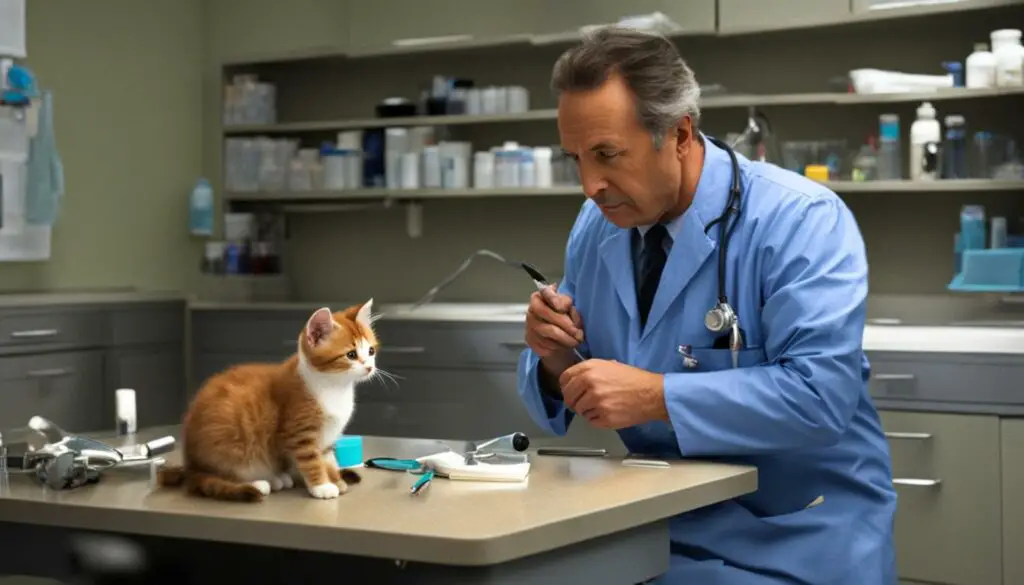
Dental Care Tips for Kittens
Proper dental care is essential for maintaining your kitten’s oral health. By incorporating these dental care tips into your routine, you can help prevent dental problems and ensure your kitten has a healthy smile.
1. Start Early with Toothbrushing
Introduce your kitten to toothbrushing as early as possible to establish a positive dental care routine. Use a vet-approved toothbrush and toothpaste formulated specifically for cats. Start by gently rubbing your kitten’s teeth and gums with your finger, gradually transitioning to a toothbrush over time. Be patient and offer rewards or treats to make toothbrushing a positive experience for your kitten.
2. Provide Dental-Friendly Toys
Offer your kitten a variety of dental-friendly toys to help promote healthy teeth and gums. Opt for toys that are specifically designed to clean teeth or massage the gums. These toys can help remove plaque and tartar buildup while providing entertainment for your kitten.
“Providing dental-friendly toys not only keeps your kitten entertained but also helps maintain good oral health.”
3. Schedule Regular Dental Check-Ups
Regular dental check-ups with a veterinarian are crucial for monitoring your kitten’s dental health. During these visits, the vet can identify any potential dental issues, provide professional cleanings if necessary, and offer guidance on maintaining optimal oral hygiene for your kitten.
4. Pay Attention to Diet
Feeding your kitten a balanced diet promotes overall health, including dental health. Opt for high-quality cat food that supports dental health, such as kibble specifically designed to promote chewing and clean teeth. Avoid feeding your kitten excessive amounts of soft or sticky foods, as these can contribute to tartar buildup.
| Dental Care Tips for Kittens: |
|---|
| Start early with toothbrushing |
| Provide dental-friendly toys |
| Schedule regular dental check-ups |
| Pay attention to diet |
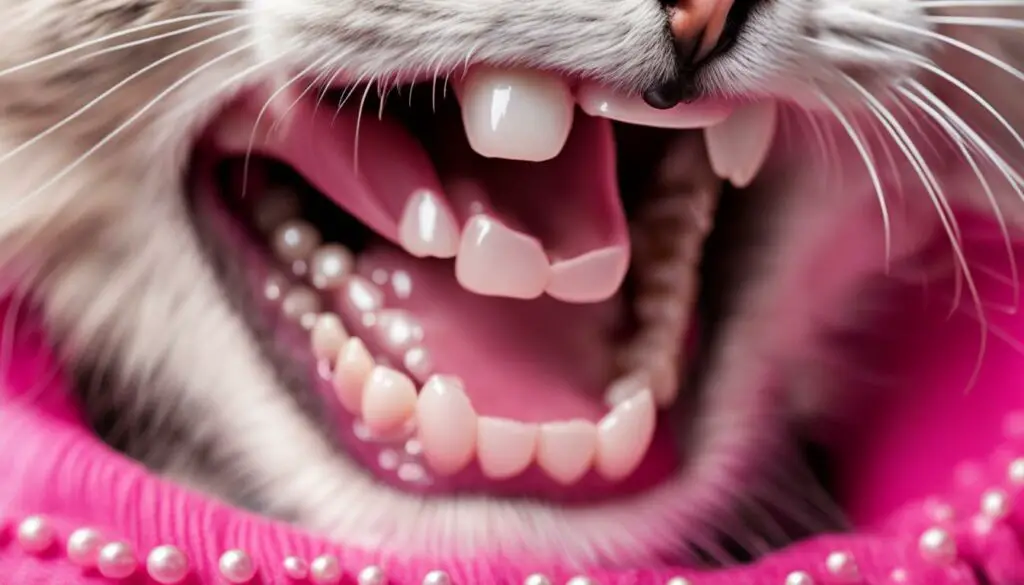
By following these dental care tips, you can help ensure that your kitten enjoys a lifetime of good oral health. Remember to seek professional veterinary advice if you have any concerns or questions about your kitten’s dental care.
Conclusion
As a responsible cat owner, it’s essential to be well-informed about your kitten’s dental development. Understanding the process of kitten tooth loss around 5 months can help you provide proper care and support during this crucial stage. By following the timeline of kitten teething, monitoring signs and symptoms, and implementing dental hygiene tips, you can ensure your kitten’s oral health.
Remember to provide appropriate toys for your teething kitten to chew on and avoid any objects that may be hazardous. Regular veterinary check-ups are essential for monitoring your kitten’s dental development and addressing any concerns promptly. In addition, prioritize your kitten’s dental care by brushing their teeth regularly with a vet-approved brush and toothpaste designed for cats.
By incorporating these practices into your kitten’s routine, you can help prevent dental issues, promote good oral hygiene, and ensure your furry friend’s overall well-being. If you ever have any specific concerns or questions, don’t hesitate to consult with your veterinarian for expert advice tailored to your kitten’s needs.
FAQ
Why do kittens lose their teeth?
Kittens lose their teeth as part of their normal dental development. When their adult teeth start to come in, the baby teeth become loose and eventually fall out.
What happens if a kitten doesn’t lose their baby teeth?
If a kitten doesn’t lose their baby teeth, it can lead to dental problems. The retained baby teeth can block the emerging adult teeth, causing issues such as breakage or infection.
What if I never saw my kitten’s baby teeth?
It’s possible that you may not see your kitten’s baby teeth. They are very small and can easily be swallowed while eating or grooming. As long as your kitten’s adult teeth are coming in properly, there shouldn’t be a cause for concern.
What signs indicate that my kitten is teething?
Signs that your kitten is teething include increased chewing, decreased appetite, decreased grooming, approaching food cautiously, finding baby teeth, and mild gum inflammation known as gingivitis.
How can I help my teething kitten?
You can help your teething kitten by providing pet-safe toys for them to chew on, ensuring they have plenty of playtime to distract from discomfort, and avoiding pulling toys from their mouth. It’s also important to wait until they have finished teething before brushing their teeth and to avoid hard kibble if their gums or teeth are sore.
When should I seek veterinary assistance for my teething kitten?
You should seek veterinary assistance if your teething kitten is in pain, has difficulty eating, dribbles, paws at their mouth, or exhibits signs of gum disease. You should also see a vet if their adult teeth don’t appear, baby teeth don’t fall out, or if there are signs of infection or other dental issues.
What should I feed my teething kitten?
It’s best to feed your teething kitten food designed for young cats that is softer on their sensitive teeth. Avoid hard adult cat food, as it can potentially chip their baby or kitten teeth. Canned cat food is also an option.
How can I take care of my kitten’s dental health?
To take care of your kitten’s dental health, introduce them to teeth brushing at a young age using a vet-approved brush and toothpaste. Regular dental check-ups with a veterinarian are also important. They can provide guidance on proper dental care and recommend additional treatments if necessary.
Why is it important to monitor my kitten’s teeth?
Monitoring your kitten’s teeth is important to detect any dental issues early on. Regularly check their teeth and gums for signs of decay, discoloration, or abnormalities. Any changes in their eating habits should also be noted, as they can indicate dental problems.
What are retained deciduous teeth in cats?
Retained deciduous teeth in cats refer to the condition where a kitten does not lose their baby teeth, causing them to be blocked by the emerging adult teeth. This condition can lead to dental problems and should be addressed by a veterinarian.
What teething habits do kittens develop?
Kittens may develop habits such as chewing on objects to alleviate discomfort during teething. It’s important to ensure that the objects they chew on are safe and redirect their chewing behavior to prevent damage to household items.
How can I make the teething experience comfortable for my kitten?
To make the teething experience comfortable for your kitten, offer them chilled teething toys or wet washcloths to chew on. Massaging their gums gently with your finger can also provide relief. Providing plenty of love, care, and attention during this time can help comfort your kitten.
What is the role of veterinary assistance in teething kittens?
Veterinary assistance plays a vital role in ensuring the well-being of teething kittens. Regular check-ups allow the veterinarian to monitor dental development, detect issues early on, and provide guidance and treatment. Seek vet help if you have any concerns or questions.
What dental care tips should I follow for my kitten?
Dental care tips for kittens include regularly brushing their teeth with a vet-approved brush and toothpaste, providing dental-friendly toys and treats, and scheduling regular dental check-ups with a veterinarian.

